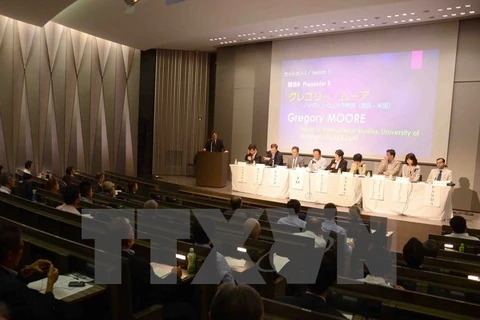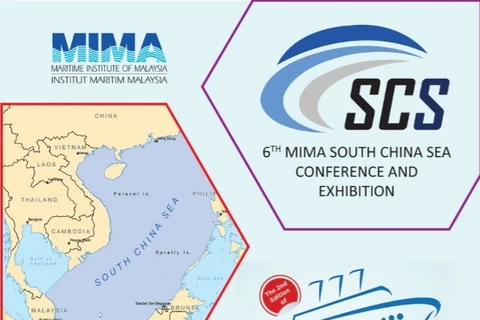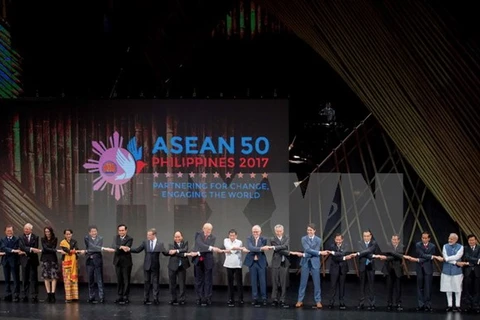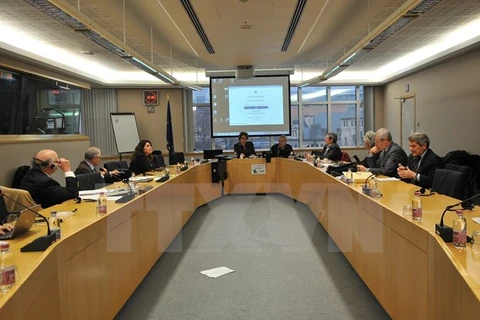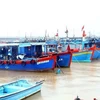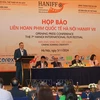HCM City (VNA) – The ninth East Sea International Conference opened in Ho Chi Minh City on November 27, focusing on the theme “Cooperation for Regional Security and Development”.
The two-day event, jointly held by the Diplomatic Academy of Vietnam (DAV), the Foundation for East Sea Studies (FESS) and the Vietnam Lawyers' Association (VLA), is drawing around 200 delegates, including nearly 90 international scholars and representatives from several foreign representative offices in Vietnam.
The conference aims to provide both Vietnamese and foreign scholars with a multi-dimensional insight into the East Sea situation over the past year, and discuss measures to maintain peace and stability in the region and boost cooperation.
Nearly 30 papers presented at the event are expected to assess developments in the East Sea, international relations and order seen from the legal angle, military and semi-military balance in the East Sea, initiatives to foster sustainable development and cooperation, and the content and progress of a Code of Conduct in the East Sea.
In his opening remarks, DAV Director Nguyen Vu Tung said that East Sea remains one of the difficult problems for international researchers and scholars.
After the Permanent Court of Arbitration (PCA)’s ruling in July last year, the East Sea situation has seen positive changes, but worries remain about the risk of disorders and conflicts in the waters in the long run, Tung stated.
According to him, the order in the sea has been eroded as international law has yet to be respected fully, while efforts to control disputes are reactive and patchy.
There also exists a paradox that in spite of a lot of cooperative initiatives, the real results are limited due to a lack of strategic trust. Therefore, the East Sea situation may grow more complicated in the coming year, he said.
Tung stressed the need for comprehensive, long-term and sustainable solutions to prevent the situation from getting more serious and threatening the security ecosystem of the entire region.
Mentioning the role of international jurisdictional mechanisms in increasing the role of international law, former Chief Judge of the International Tribunal for the Law of the Sea (ITLOS) Vladimir Vladimirovich Golitsyn stated that the role of international jurisdictional offices should be enhanced as the establishment of tribunals is an important role in improving international law supremacy and maritime administration.
Prof. Brahma Chellaney from the Centre for Policy Studies of India, said that there is a realignment of order, affecting the region’s political stability and the world’s centre moving to the Indo-Pacific region, in which the East Sea is the most important water area with a crowded maritime route connecting the Indian Ocean and the Pacific.
Currently, the Indo-Pacific region is holding the key to world security and order. Therefore, any instabilities arising in the East Sea affect not only countries in the region but also many other countries and regions, Brahma Chellaney affirmed.
The professor suggested parties involved respect international regulations and principles.
The East Sea provides one of the most important maritime lanes in the globe and benefits many countries. Therefore, maintaining peace, stability, navigation and over flight security, safety, and freedom in the sea area is the top priority. The parties concerned should display their responsibility in abiding by international law, specifically upholding the supremacy of the rule of law in the East Sea. Every extreme reaction or activities defying international law will fuel tensions and complicate the situation.
In recent years, the East Sea issue has attracted much attention from the international community.
In July 2016, the PCA ruled that China’s claims over historical rights within the “nine-dash line” run counter the 1982 UN Convention on the Law of the Sea (UNCLOS), so it has no legal value.
The tribunal also verified that no features in the Spratly archipelago could be considered an island and so are not entitled to a 200 nautical mile exclusive economic zone under UNCLOS.-VNA
VNA

